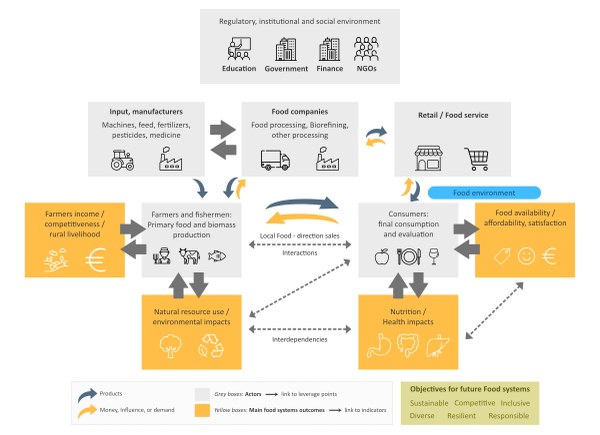Research
Food Systems |
Sustainable Food Systems |
|
Food systems encompass all steps from production to consumption and the associated health consequences. The ZNE’s system approach takes into account all resources (inputs and outputs) and assesses the potential for strengthening resilience, food sovereignty and security, and improving efficiencies, which are influenced spatially and temporally by environmental, socio-economic and political factors. (following closely the definition of the HLPE, 2017) click to enlarge |
Sustainable Food Systems are...
("Approaches for the promotion of sustainable food systems". Results paper of BMBF research projects on nutrition. NaWiKo synthesis paper)
Ensuring nutrition -today and tomorrow- in the face of continuing population growth while taking sustainability into account is an immense challenge that can only be solved through interdisciplinary thinking and acting. The necessary transformation of current food systems into sustainable food systems requires consideration of all stages from production, processing, distribution, use, consumption and recycling and brings them in line with the 17 Sustainable Development Goals (SDGs) to avoid unintended and irreversible consequences. For example, future food systems need to introduce more crop genetic diversity to increase resilience to climatic extremes and enhance biodiversity to support pollinators. Furthermore, conservation and protection of resources should be valued as ecosystem services of sustainable agriculture.
The ZNE is a cross-departmental institution at JLU that provides a platform for scientific initiatives that take a system view of sustainable agriculture, food production and human nutrition. The integration of multi-, inter- and transdisciplinary research approaches aims to combine basic and applied research on food systems in their regional, national and global contexts. |
|
|
|
Publications of ZNE-members >> |
|
Projects |
Cooperation Partners |
 |
 |
|
Questions of sustainable food systems are investigated at JLU in individual and collaborative projects, both at all levels of the food value chain and with regard to the regulatory, institutional and social environment. The multi-, inter- and transdisciplinary projects demonstrate the diverse research competences that are bundled in the ZNE. |
In order to meet the complex challenges of transforming food systems, it is necessary for experts from various disciplines to work together with a range of societal actors. The ZNE therefore promotes internal cooperation between disciplines at JLU and maintains intensive contacts with external cooperation partners from science and society. |
| To the Projects » | To our cooperation partners » (available soon) |

